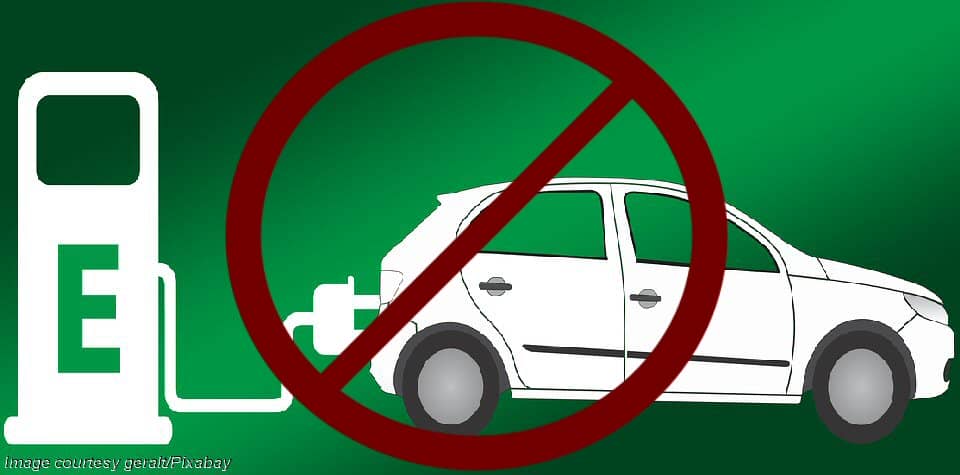Auto Dealers Push Back Against Mandatory EV Sales

Table of Contents
Financial Concerns Fueling Dealer Resistance
The transition to selling electric vehicles presents substantial financial challenges for auto dealers. The upfront investment required is significantly higher than for traditional gasoline-powered vehicles. This resistance to EVs stems from several key financial obstacles:
-
Higher initial investment in EV inventory and charging infrastructure: Dealerships must invest heavily in stocking EVs, which often have higher initial purchase prices. Furthermore, significant investments are needed to install and maintain charging stations, a crucial element in attracting EV buyers. This infrastructure upgrade requires specialized equipment and skilled personnel, further increasing costs.
-
Potential for lower profit margins on EV sales due to competition and government incentives: The EV market is increasingly competitive, with manufacturers offering various incentives and rebates to consumers. This can squeeze dealer profit margins, especially when factoring in the higher upfront costs.
-
Lack of government support for dealer infrastructure upgrades: While governments often provide incentives to consumers, support for dealers in upgrading their infrastructure to handle EV sales and servicing remains inadequate in many regions. This creates a significant financial burden on individual dealerships.
-
Uncertainty surrounding consumer demand and future EV regulations: The long-term viability of the EV market remains uncertain for some dealers. Fluctuations in consumer demand and the ever-changing landscape of EV regulations add to the financial risk.
Challenges in EV Sales and Consumer Perception
Beyond the financial hurdles, auto dealers face considerable challenges in effectively selling electric vehicles to consumers. Several key factors contribute to this resistance to EVs on the part of consumers:
-
Educating consumers about EV technology and dispelling misconceptions: Many consumers remain unfamiliar with EV technology, harboring misconceptions about range, charging times, and battery life. Dealerships must invest in extensive training programs to educate their sales staff and effectively address these consumer concerns.
-
Addressing concerns about range, charging infrastructure, and battery life: Range anxiety, the fear of running out of battery power, remains a significant obstacle to EV adoption. Limited charging infrastructure in certain areas further exacerbates this issue. Dealers need to address these concerns transparently and proactively.
-
Need for specialized sales training to effectively sell EVs: Selling EVs requires a different approach than selling gasoline vehicles. Sales staff needs specialized training to effectively communicate the benefits of EVs, address consumer concerns, and navigate the complexities of charging infrastructure and government incentives.
-
The impact of consumer perception on EV sales: Negative perceptions about EVs, whether based on factual inaccuracies or emotional biases, can significantly hinder sales. Overcoming these perceptions requires a concerted effort from dealers to build consumer trust and confidence.
The Impact of Government Mandates on Dealer Operations
Government mandates requiring a certain percentage of EV sales put significant pressure on auto dealers. These regulations have far-reaching implications:
-
The financial burden of meeting mandatory EV sales targets: Meeting quotas can force dealers to invest heavily in EV inventory, even if consumer demand doesn't match the mandated levels, leading to potential financial losses.
-
Potential penalties for failing to meet quotas: Non-compliance with mandatory EV sales targets can result in significant financial penalties, further straining the financial stability of dealerships.
-
Increased administrative and compliance costs: The increased paperwork, reporting requirements, and compliance procedures associated with EV mandates add to the administrative burden and operational costs for dealerships.
-
Concerns about government overreach and restrictions on dealer operations: Dealers worry that these mandates represent government overreach and infringe upon their autonomy to manage their businesses effectively.
Lobbying Efforts and Industry Response
In response to mandatory EV sales policies, various industry associations and lobbying groups are actively working to counter these mandates. These groups are leveraging political pressure, public relations campaigns, and legal challenges to advocate for policies that better reflect the concerns of auto dealers. Their counter-arguments often focus on the economic viability of rapid EV adoption, the need for improved charging infrastructure, and the importance of maintaining dealer autonomy.
Conclusion
The pushback against mandatory EV sales by auto dealers highlights a complex interplay of financial concerns, consumer perceptions, and regulatory burdens. The high upfront costs, challenges in consumer education, and the impact of government mandates on dealer operations cannot be ignored. Understanding the economic realities and practical challenges faced by dealerships is crucial for a smooth and equitable transition to a more sustainable automotive sector. Understanding the pushback against mandatory EV sales is crucial for shaping a sustainable and equitable future for the automotive industry. Learn more about the ongoing debate and contribute your perspective on the implications of mandatory EV sales.

Featured Posts
-
 Economists Forecast Bank Of Canada Interest Rate Cuts Due To Tariff Impacts
May 12, 2025
Economists Forecast Bank Of Canada Interest Rate Cuts Due To Tariff Impacts
May 12, 2025 -
 Indy 500 Entry List Grows Takuma Sato Confirms 34th Spot
May 12, 2025
Indy 500 Entry List Grows Takuma Sato Confirms 34th Spot
May 12, 2025 -
 Boston Celtics Clinch Division After Dominant Performance
May 12, 2025
Boston Celtics Clinch Division After Dominant Performance
May 12, 2025 -
 Graham Rahal Showcases The Exceptional Performance Of The 911 Gt 3 Rs 4 0
May 12, 2025
Graham Rahal Showcases The Exceptional Performance Of The 911 Gt 3 Rs 4 0
May 12, 2025 -
 Speculation And Predictions Who Will Be The Next Head Of The Catholic Church
May 12, 2025
Speculation And Predictions Who Will Be The Next Head Of The Catholic Church
May 12, 2025
Latest Posts
-
 Braunschweiger Grundschule Entwarnung Nach Bombendrohung In Niedersachsen And Bremen
May 13, 2025
Braunschweiger Grundschule Entwarnung Nach Bombendrohung In Niedersachsen And Bremen
May 13, 2025 -
 Niedersachsen And Bremen Entwarnung Nach Bombendrohung An Braunschweiger Grundschule
May 13, 2025
Niedersachsen And Bremen Entwarnung Nach Bombendrohung An Braunschweiger Grundschule
May 13, 2025 -
 Schule In Braunschweig Evakuierung Nach Erneutem Sicherheitsalarm
May 13, 2025
Schule In Braunschweig Evakuierung Nach Erneutem Sicherheitsalarm
May 13, 2025 -
 Braunschweiger Schule Erneuter Polizeieinsatz Kinder In Sicherheit
May 13, 2025
Braunschweiger Schule Erneuter Polizeieinsatz Kinder In Sicherheit
May 13, 2025 -
 Alarm An Braunschweiger Schule Grosseinsatz Der Polizei Gebaeude Evakuiert
May 13, 2025
Alarm An Braunschweiger Schule Grosseinsatz Der Polizei Gebaeude Evakuiert
May 13, 2025
